The parents of terminally ill toddler Alfie Evans have launched a new legal challenge to ask a judge to allow him to continue to receive medical treatment.
It’s the latest step in a months long dispute between Alfie’s parents and the doctors caring for him about what is best for him.
Who is Alfie Evans?
 Image Credit: Facebook
Image Credit: Facebook
Alfie Evans is a 23-month-old toddler who was born in April 2016. A few months later, it became clear that something wasn’t right and Alfie became very seriously ill.
Doctors don’t know what triggered or caused his illness, and have not been able to agree on a definitive diagnosis, but what is clear is that Alfie is suffering from a “catastrophic and untreatable” degenerative brain condition.
The hospital caring for Aflie have said that treatment is ‘futile’, unkind, unfair and inhumane’. His parents disagree.
Since November 2016 he has been dependent on a ventilator to breathe. He is unable to swallow or communicate with his environment and will never, doctors say, make any developmental progress with motor skills, vision, hearing, social or emotional skills.
The hospital caring for Alfie have said that treatment is “futile” and that to continue to treat him would be “unkind, unfair and inhumane”. They want to withdraw ventilation from Alfie and provide him with good quality palliative care.
Alfie’s parents disagree and wanted ventilation to be maintained. They also want to be able to take him to a hospital in Italy for further investigation and treatment.
How Are These Decisions Made?

Alfie’s parents. Image Credit: Facebook
Alfie’s parents, and many others supporting them, believe that it should be up to parents and nobody else to make a decision about what should happen to a child.
Normally, this is true. Where decisions need to be made about medical treatment for babies and very young children, it falls to whoever has parental responsibility for that child to make the decision on their behalf. This is because we think that parents have their child’s interests at heart and are best placed to make decisions for them.
The sole principle is that the best interests of the child must prevail and that must apply even to cases where parents, for the best of motives, hold on to some alternative view.
They can’t make any decisions they want, however. Their decisions must be guided by what will be in the “best interests” of their child. This means they can’t insist on treatment which will harm their child.
The problem arises where there is disagreement about what is going to be best for a child. In this case, the doctors caring for Alfie disagree with his parents that keeping him alive is in his best interests. They think it would be better for him to be cared for and be able to die peacefully.
This disagreement means that the courts have had to step in to decide what course of action should be taken. They too must make sure that whatever they decide is in the best interests of the child. As Lord Justice McFarlane made clear in the case of Charlie Gard, which involved another terminally ill child whose parents wanted to take him abroad for treatment, what is of utmost importance is that “measures and treatments adopted are the most compatible with maintaining… dignity”.
What Have The Courts Said?
 This case first went to the High Court in February, where the judge, Mr Justice Hayden agreed with the hospital. He concluded that continuing treatment was not in Alfie’s best interests. He said that he believed every reasonable option had been explored for Alfie, but that he had no hope of recovery, and continuing ventilation would compromise his “future dignity and fail to respect his autonomy”.
This case first went to the High Court in February, where the judge, Mr Justice Hayden agreed with the hospital. He concluded that continuing treatment was not in Alfie’s best interests. He said that he believed every reasonable option had been explored for Alfie, but that he had no hope of recovery, and continuing ventilation would compromise his “future dignity and fail to respect his autonomy”.
He said that Alfie now needs palliative care and: “Peace, quiet and dignity in order that he may conclude his life, as he has lived it, with dignity.”
Alfie’s parents appealed to the Court of Appeal who agreed with Mr Justice Hayden. When they appealed to the Supreme Court, the judges did not grant permission for the case to be heard. They said that the law on making medical decisions for children was clear, and that there was no “arguable point of law” in this case.
Finally, Alfie’s parents appealed to the Human Rights Court who also decided they would not hear the case. They declared that there was “no appearance of the rights and freedoms set out in the European Convention on Human Rights” being violated.
Alfie’s treatment has sparked protests outside the hospital in Liverpool where he is being cared for. Now his parents hope that a last-minute appeal to the Court of Appeal will result in a different decision.
What Happens Now?
Alfie’s case has been listed at the Court of Appeal for Monday. This is not the first time that the courts have had to grapple with these issues: last year, the case of Charlie Gard gained widespread media coverage – even reaching the attention of Donald Trump. Earlier this year, the court ruled that life support should be withdrawn from 11-month-old Isaiah Haastrup.
But it doesn’t make it any easier to approach these decisions. It’s impossible not to be moved by the anguish of parents who want to do what they think is right for their child.







